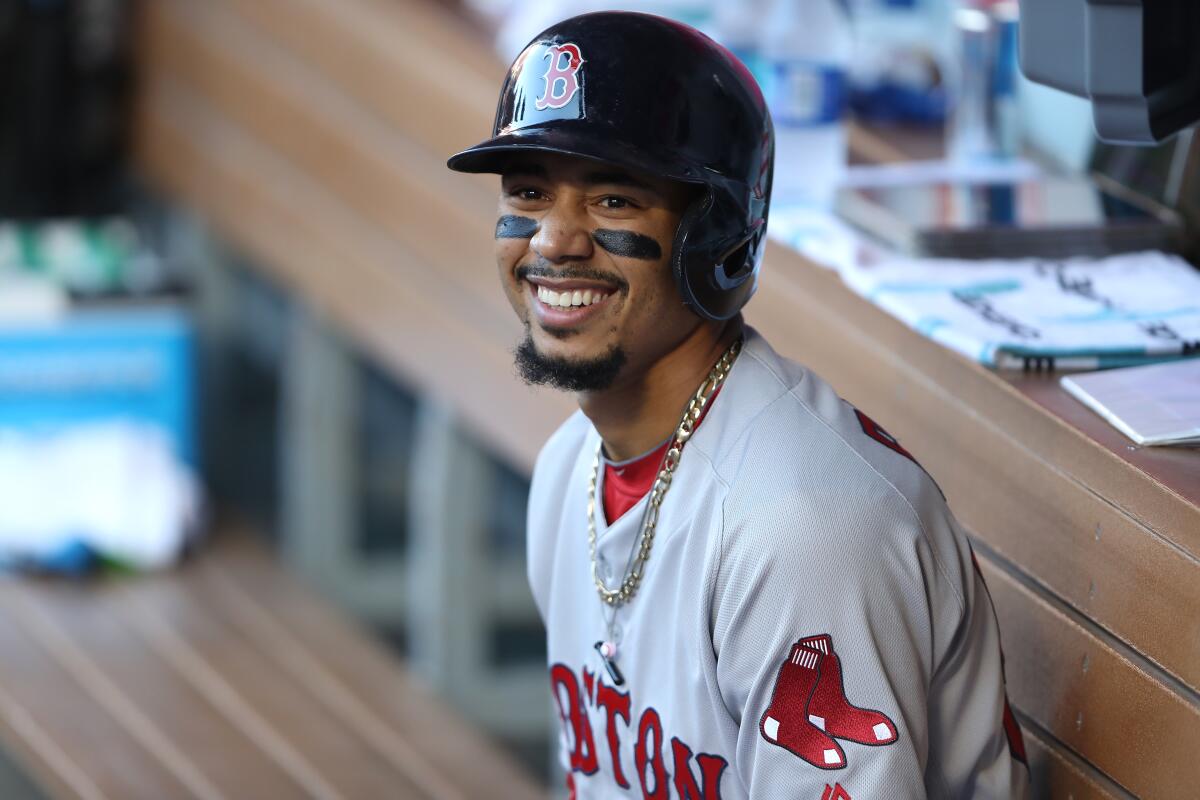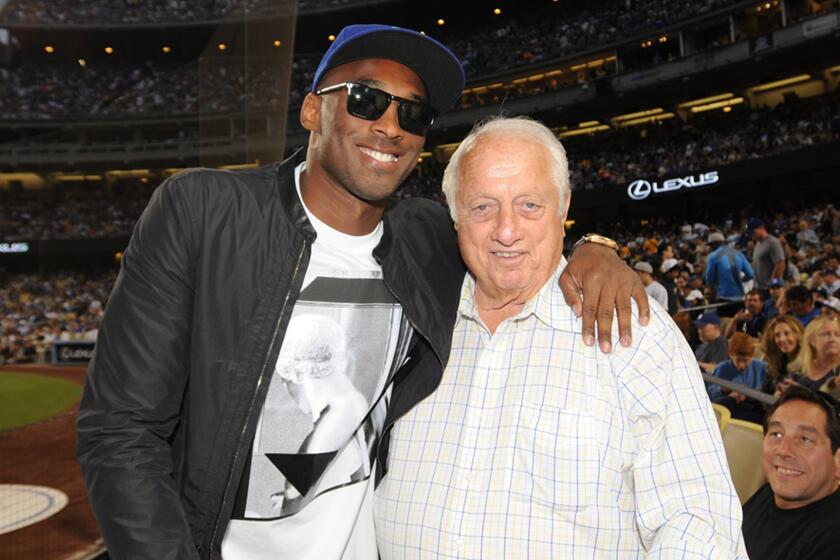Dodgers must seize the moment and acquire Mookie Betts from the Red Sox

- Share via
They were interested in Bryce Harper, but didn’t sign him.
They wanted Gerrit Cole, but didn’t land him, either.
The Dodgers are now in the market for Mookie Betts, and a potential obstacle is one with which they are familiar: Money.
The fact they would likely have to stretch themselves financially to make a trade with the Boston Red Sox should be viewed as both a source of optimism and skepticism.
On one hand, the Dodgers have the money, or at least they should. They are entering the seventh year of a 25-year, $8.35-billion broadcast agreement that made their games vanish from the majority of the television screens in their market. They have raised ticket prices year after year.
On the other hand, their owners have demonstrated a reluctance to reinvest into their on-field product beyond a certain point.
The passivity cost them Harper and Cole. They shouldn’t make the same mistake with Betts, a dynamic all-around talent who could be the best player in the game outside of Mike Trout.
On the surface, the situations are entirely different. Harper and Cole were free agents. Betts is under contract with the Red Sox for one more season. But the Dodgers’ pursuit of Betts, like the team’s failed recruitments of Harper and Cole, can be resolved with cold hard cash.
The Dodger remains interested in trading for an All-Star player and have been engaged in trade talks with the Boston Red Sox about acquiring outfielder Mookie Betts.
The Red Sox are looking to tear down their aging roster and rebuild, which in the upside-down baseball world of today, makes the 27-year-old Betts expendable. The 2018 American League most valuable player will be paid $27 million this year and will become a free agent after the season.
Acquiring a player of Betts’ caliber, even as a one-year rental, would typically cost an organization its top prospects. The Dodgers have fiercely protected their top prospects, as Andrew Friedman made in-season trades for the likes of Yu Darvish and Manny Machado without dealing any of the elite talent from the farm system. They remain steadfast in their refusal to trade infielder Gavin Lux or right-handed pitcher Dustin May.
This is where the money becomes useful. Instead of their best prospects, the Dodgers can offer the Red Sox additional salary relief.
Whether a deal is completed could very well come down to how much of starting pitcher David Price’s contract the Dodgers are willing to take on. The 34-year-old Price is owed $96 million over the next three seasons.
As much as the Dodgers like to boast about their analytically based approach and well-stocked farm system, their greatest weapon in their negotiations with the Red Sox is their financial strength. They might as well use it.

In theory, this is the kind of moment for which they have spent years preparing. They reduced their payroll and remained under the luxury-tax threshold in each of their last two seasons, so that if they were to be penalized in the future for exceeding it, they would be punished as first-time offenders.
They didn’t take advantage of this flexibility when Harper was on the market. They didn’t exploit it when Cole was available.
How much farther down the road can they kick the can? What good is financial flexibility if it’s never used?
In October, the Dodgers will be 32 years removed from their last World Series championship.
While the organization is set up to remain competitive for the foreseeable future, a window of sorts is closing, as some long-term Dodgers are nearing the end of their careers. Justin Turner’s contract expires after this season, Clayton Kershaw’s and Kenley Jansen’s after the next.
The Dodgers owe it as much to them as they do the fans to do everything in their power to win a championship.
An All-Star in each of the last four seasons, Betts is a right-handed hitter who would complement the Dodgers’ left-handed-heavy lineup and a superb outfielder who would improve their already-solid defense.
Dodgers infielder Justin Turner grew up idolizing Kobe Bryant and pitcher Clayton Kershaw admired the Lakers star for his larger-than-life presence.
An argument could be made about how the Dodgers are capable of reaching the World Series without Betts because their lineup still looks as if it’s the best in the National League by a wide margin. But if anything, the league’s relative weakness should provide the Dodgers with a greater incentive to fortify their roster. The better the chance they have to reach the World Series, the better the chance an investment in Betts will result in the ultimate reward.
If the Dodgers trade for Betts, there is the danger that he will sign with another team next offseason. He figures to be in line for a contract closer to Trout’s 12-year, $426.5-million deal with the Angels than Harper’s 13-year, $330-million agreement with the Philadelphia Phillies.
Regardless of whether the Dodgers acquire Betts in the coming days or weeks, they figure to be one of his suitors next offseason. At the kind of price Betts will command, they would be smart to spend a season with him to see whether he fits in their culture.
It’s entirely possible another team will offer the Red Sox prospects who could be franchise cornerstones. But that’s also unlikely in baseball’s current climate. And if this is a situation the Dodgers can resolve by opening their bank vaults, they should. They are a big-market team. They should start acting like one again.
More to Read
Are you a true-blue fan?
Get our Dodgers Dugout newsletter for insights, news and much more.
You may occasionally receive promotional content from the Los Angeles Times.













